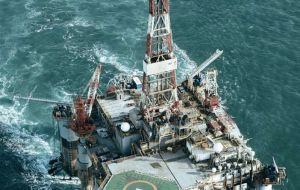MercoPress. South Atlantic News Agency
Falklands assesses impact of hundreds of new jobs as it develops the oil and gas industry
 The development of the Sea Lion field would create a short/medium term spike in labour demand with 550 extra on-shore jobs in the short term
The development of the Sea Lion field would create a short/medium term spike in labour demand with 550 extra on-shore jobs in the short term  The spike in labour demand according to consultants will mean reviews of immigration and property ownership, among other issues
The spike in labour demand according to consultants will mean reviews of immigration and property ownership, among other issues A more permanent integrated type of immigration for the Falkland Islands is a strong message that has come out of a consultation with Falklands residents, in the preparation for a socio-economic study of oil and gas development in the South Atlantic British Overseas Territory.
According to the latest edition of Penguin News, this may mean changes to matters such as the ability to own property for those on work permits and changes to the system to encourage a move to PRP (Permanent Resident Permit) status, since hundreds of new jobs temporary and permanent will be created as the Falklands develops its oil and gas resources.
The study commissioned by the Falklands government and undertaken by Regeneris Consulting has now been made public following an examination by Members of Legislative Assembly last week.
In its numerous key findings it was noted that while development of the Sea Lion field by Premier Oil, would create a very significant short/medium term spike in labour demand with employment potentially peaking at around 550 extra on-shore in the short term, in the longer term the development will overall support around 170 jobs in the Falklands, plus 125 offshore jobs. However under other scenarios the longer term increase in jobs would be much larger at 600 to 800 plus.
The potential development of an onshore Liquefied Natural Gas (LNG) plant would require several thousands of workers in its construction over a three to four year period and several hundreds in its operational phase.
It says the Falklands will have to allow extra workers to come to fill the increase in jobs driven by oil and gas: “There is no other solution to the demands that will be placed on the economy and labour market.”
Under housing and accommodation in its summary of policy recommendations Regeneris believe FIG should lead or support the private sector to increase the rate of house building over the period 2013-15 to around 40 homes per year. Also the FIG will need to plan for the provision of temporary workers accommodation for 200 to 300 workers.
In one extreme scenario (‘big oil’ plus land based LNG) it suggests the population could increase by 1,760 by 2030. The smallest increase of 240 anticipated by 2030 would be under the model ‘Sea Lion plus exploration’.
The authors express concern that economic growth could lead to migration from the Camp to Stanley: “there is a need for FIG to consider ways to counteract the migratory pressures towards Stanley,” including continued investment in infrastructure and services to support farms and settlements.
They also recommend that FIG resurrect plans to expand Fitzroy potentially for it to become a base for contractors working at MPA.
The report also examines the overall economic effects of oil development, population and migration, infrastructure, public services, the labour market and skills and business opportunities.
Head of Policy Jamie Fotheringham emphasised however, “that at this stage the views in the report remain those of the consultants – FIG will respond to this in due course but we wanted to publish the full report to stimulate debate rather than sit on it whilst we considered its findings.” (PN).-




Top Comments
Disclaimer & comment rules-

-

-

Read all commentsIt looks like the Falkland Islands population is set to explode.
Jul 05th, 2013 - 08:17 am 0Numerous 'permanent' workers may work towards full citizenship, as they and their families live and work on the Falklands.
Argentina must be getting pretty worried by now, and no doubt will be shouting out 'Implanted Population' whilst ignoring the fact that they are all implanted too.
Great News!
Jul 05th, 2013 - 09:10 am 0no sign of argentinas court threats having any effect then :))))
Yeah great news but hope it doesn't impact too heavily on the beautiful and pristine Falklands environment.
Jul 05th, 2013 - 10:05 am 0Commenting for this story is now closed.
If you have a Facebook account, become a fan and comment on our Facebook Page!